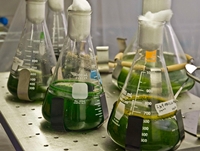Scripps and SoCalGas System to Use Algae to Capture Carbon Dioxide
31 Jul 2012
Scripps Institution of Oceanography at UC San Diego (Scripps) and Southern California Gas Co (SoCalGas) have entered into an agreement focusing on the design of an innovative system in which algae consume carbon dioxide (CO2) emissions from natural gas combustion and cost-effectively convert it into valuable byproducts such as biomethane, biodiesel and animal feed.
 For several years, researchers at Scripps, a member organisation of the San Diego Center for Algae Biotechnology, and a number of commercial companies around San Diego and elsewhere, have been studying how algae can most efficiently be developed into a clean, renewable biofuel to one day replace non-renewable fossil fuels.
For several years, researchers at Scripps, a member organisation of the San Diego Center for Algae Biotechnology, and a number of commercial companies around San Diego and elsewhere, have been studying how algae can most efficiently be developed into a clean, renewable biofuel to one day replace non-renewable fossil fuels.
Taking this research a step further, Scripps' researchers hope to leverage algae's natural ability to absorb CO2 in the environment and convert it into oil rich biomass or biomethane or refined into fossil fuel replacements. After extracting the oils for biodiesel, the remaining biomass can be sold as a safe, protein-rich animal feed.
The new collaboration between Scripps and SoCalGas includes an investigative research and systems engineering study to explore how algae production systems currently in development could most effectively capture industrial CO2 emissions.
Targeted CO2 sources include, natural gas power plants, large engines used in natural gas compression and water pumping and boilers used to produce steam for industrial processes such as enhanced oil recovery.
''We are very excited to enter into this collaboration with Southern California Gas Company and bring our world-class scientific and engineering analysis capabilities to bear in assessing state-of-the-art algal culture systems for CO2 capture from point sources,'' said Dominick Mendola, a senior development engineer in the laboratory of Greg Mitchell, a Scripps research biologist who is exploring marine algae for their potential as a new biofuel source.
Mendola adds, ''If the Phase I analysis proves such systems can be safe and economical, we then hope to enter into a Phase II agreement to help SoCalGas build and operate a module of a commercially scaled system, and test its capabilities at a site to be selected within Southern California.''
Hal D. Snyder, vice president of customer solutions, SoCalGas, says, ''We are strongly committed to supporting the development of zero and near-zero- emission natural gas technologies. Recovering CO2 from combustion and turning it into a valuable commodity such as biomethane, biodiesel or a high-quality animal feedstock is great for the environment while creating valuable products. None of this is easy, but working with world-class scientific organisations like Scripps Institution of Oceanography and UC San Diego greatly improves our chances of success.''



















